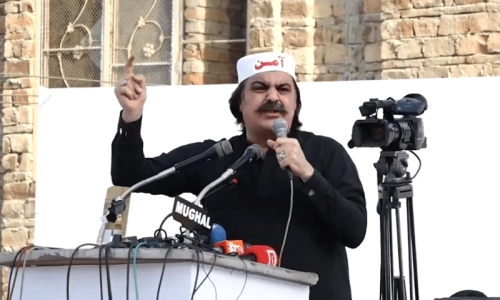The Pakistan Tehreek-i-Insaf (PTI) loves to reorganise itself in Punjab. Young, exploring and expanding, it is frequently found adjusting, some of the rearrangements caused by the ambitious entrants into Imran Khan’s camp.
Such reorganisation is again on. The object is to “purge the party of factionalism and groupings” that have intensified in the wake of “conventional” politicians joining it “in large numbers”.
PTI politicians admit that growing factionalism is damaging the party. Some blame groupings within for its poor showing in the recently held election for the cantonment boards in Punjab. The results especially in Lahore and Rawalpindi, where the PTI claims to have strong following in the urban middle-class, left the PTI stalwarts wanting urgent remedial measures.
Even Chairman Imran Khan attributes the poor performance in the cantonment boards to divisions in the party. Speaking at a reception in Lahore recently, he expressed concern over groupings within the party ranks. He warned that the party faced a “serious inside threat”. “In this situation, the party does not need an enemy.”
Old party loyalists assign the blame for increasing divisions in the organisation to their leadership’s decision to accept ‘electables’ into the PTI folds. “The defectors have brought the culture of drawing-room intrigues into the party,” says a Lahore-based PTI leader who does not want to give his name.
“Until we started to embrace the conventional politicians in our party, the PTI was like a strongly bonded family. Today we can’t claim it to be a united front,” he argues.
While the top PTI leadership is happy that a fairly big number of electables continue to defect to the PTI, the old party loyalists have publicly expressed strong displeasure against the new entrants.
For example, when Syed Samsam Hussain Bukhari resigned from the Pakistan Peoples Party (PPP) to join the PTI earlier this month the local PTI cadre from Okara protested by hanging banners in the city streets. “The workers will react when a lota [turncoat] joins the party; it is but natural,” argues Ali Hussain Naqvi, the PTI candidate from Renala Khurd in the 2013 elections.
“The people who are joining our party today were not kind to our workers when they were in power.”
Yet he thinks the party must “grow bigger”, cautioning the leadership to give tickets (for local government and next general) elections on merit.
The differences in its ranks are not new to the PTI. But these divisions became more prominent when the party started expanding after it had successfully organised one of the largest political rallies in Lahore in many years. The groupings became more visible in the aftermath of the intra-party elections and during the award of the tickets for the May 2013 polls.
However, Chaudhry Mohammad Sarwar, the former Punjab governor who has been given the task of reorganising the party in five central and northern divisions of the province, dismisses the reports of factionalism in the party describing workers as an asset for the party leadership. “We cannot afford factionalism in the party or disillusionment in our ranks and files. Hence, we consult our local party officials before accepting politicians from other parties into our folds,” he explains.
But old party loyalists do not consider consultations with the local party organisations sufficient enough to help the party rid of factionalism and groupings. “We were a party that stands for change; the conventional politicians who are a major hurdle in the way of this change have tainted this image and created groupings for their own sake. Now we’ve become another party just like the PPP or the PML-N, because we let such elements into the party,” Saniya Sajid, an old PTI loyalist and its former media manager, contends.
Political analyst Hasan Askari Rizvi argues that anyone can easily discern different ideological strands in the PTI scrambling for power, which has created an “internal crisis” in the party. “The PTI is faced with a serious challenge because of factionalism. If it fails to manage its internal crisis, it will be extremely damaging [for its future].”
However, Punjab PTI leader Ejaz Chaudhry rubbishes the talk of factionalism in the party.
“There may be minor groupings at the constituency level in some areas. But then this is normal [for political parties].”
Published in Dawn, July 11th, 2015
On a mobile phone? Get the Dawn Mobile App: Apple Store | Google Play














































